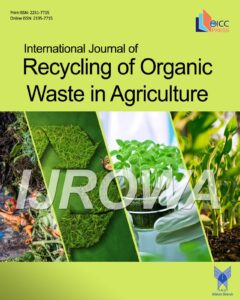Effect of substrate temperature and stages duration on recycling of agro-industrial residues through Pleurotus ostreatus production
Authors
Abstract
Purpose This study investigated the effect of recycled Olive Pruning Residues (OLPR) and Spent Coffee Grounds (SCG) on substrate temperature (temp) and duration (dur) of Pleurotus ostreatus growing stages. This study also sheds light on the correlation between selected parameters, yield, and substrate composition.
Method The experiment consisted of 2 sole substrates wheat straw (WS; control) and SCG, and 6 mixtures of WS, OLPR, and SCG (v/v): WS:SCG 3:1, WS:SCG 1:3, WS:OLPR:SCG 1:1:1, WS:OLPR:SCG 3:1:1, WS:OLPR:SCG 1:3:1, and WS:OLPR:SCG 1:1:3.
Results Increased SCG proportions caused the substrate temperature to decrease, whereas, OPLR proportions caused it to rise. All stages showed earliness in productive substrates. The highest organic matter loss (OML) was reported by WS (76.7%) (76.7%). WS:SCG 3:1 OML depicted a correlation (0.8 ≤r≥ 0.9) with dur Stages 2 and 3. OML of WS:SCG 1:3 denoted a correlation (0.8 ≤r≥ 0.9) with dur Stages 1, 2, and 3. OML of WS:OLPR:SCG 3:1:1 and WS:OLPR:SCG 1:1:1 correlated (R2 ≥ 0.7) with dur Stages 3 and 4, respectively. WS:SCG 1:3 temp had a strong influence on economic yield (EY) at all stages. At Stage 2, combined substrate temp positively affected biological efficiency (BE) and biological yield (BY). Spawn run initiation (SRI), pinhead formation (PNF), and harvest of the first flush (HF1) strongly correlated with major minerals and fatty acids in SCG substrates. Increased Mg and Fe contents affected negatively the complete mycelial colonization (100% MC) in combined substrates.
Conclusion SCG reduces OML and causes early production.




